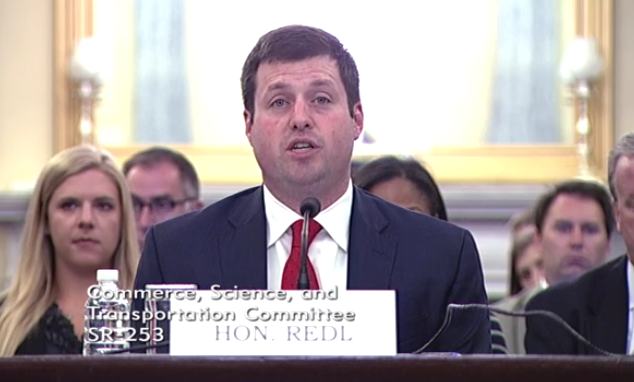NTIA's Redl: Government Shouldn't Rush to Regulate IoT 'Bugs'

The smarter way to stay on top of broadcasting and cable industry. Sign up below
You are now subscribed
Your newsletter sign-up was successful
The Trump Administration signaled Friday that cybersecurity is crucial to an internet of things world made possible by the rollout of ubiquitous 5G wireless broadband, but warned about overregulating in the face of "bugs" in that complex ecosystem of connected cars and homes and businesses.
"Without nationwide 5G, the Internet of Things won’t come close to reaching its full potential," National Telecommunications & Information Administration head David Redl told the 6th Annual Internet of Things Global Summit in Washington Friday (Oct. 5), adding: "If we want to realize the innovation and growth promised by IoT, we must ensure that Americans can trust the devices that they’re using."
He said the challenge is different from simply securing smart phones or home computers. It means securing light bulbs, cars, thermostats and appliances, a complex ecosystem that poses new issues for manufacturers as well as consumers.
Related: NTIA Launches IoT Cybersecurity Stakeholder Effort
He said that complex, connected tech also raises the stakes. "Right now, a bug can cause a computer to crash. But what about when it causes a car to crash?," He said. "It’s likely that we’re going to hear calls for government to step in and impose significant regulations."
"From NTIA’s perspective, that’s not the right approach," Redl said, pointing to self-regulation. "By applying stakeholder-driven policymaking processes as an alternative, we can achieve actionable controls and practices across the ecosystem and at the operational level that account for both the complexity of today’s digital ecosystem, as well as the speed at which bad actors attack and evolve."
He said owner-operator boots on the ground are the best safeguard, but that the Administration needed more volunteers, though he did not say just who was reluctant to step up. "[W]e still find ourselves needing to give certain groups a nudge to play ball. Our message is straightforward: We need everyone to work together to solve this problem, and we won’t be able to do it without you," he said.
The smarter way to stay on top of broadcasting and cable industry. Sign up below
But if security is job one, privacy is not very far behind. Redl pointed to NTIA research showing that nearly 75% of Internet users had "significant" concerns about security and privacy, with a third of those saying those concerns "led them to avoid some activities." He said NTIA was looking for "legal clarity, flexibility to innovate, and high levels of consumer protection."
Contributing editor John Eggerton has been an editor and/or writer on media regulation, legislation and policy for over four decades, including covering the FCC, FTC, Congress, the major media trade associations, and the federal courts. In addition to Multichannel News and Broadcasting + Cable, his work has appeared in Radio World, TV Technology, TV Fax, This Week in Consumer Electronics, Variety and the Encyclopedia Britannica.

